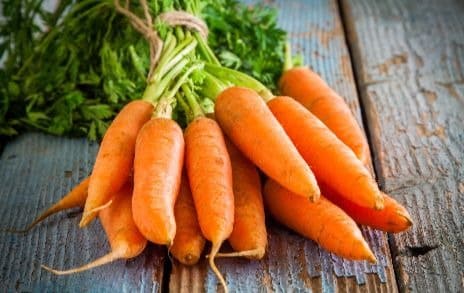Growing vegetables is both a pleasurable pastime and a guaranteed method of providing tasty, nutritious food for you and your family. It is also a great way to save money on your shopping bills. Check in every month to find out which vegetable has made the cut, as well as some useful tips on when to plant and harvest.
This month, the chosen champion is the baby carrot. The underdog of the carrot family, but still a high contender for nutrition and delicious taste.
Bodacious baby carrots
The ‘Baby Chantenay’ Cascade F1 baby carrot variety can be sown and grown outdoors from February to July. Their reduced size makes them perfect for growing in small spaces and ideal for containers. Sow the seeds at a depth of 1.5cm in rows spaced 30cm apart.
If you are sowing them in early February, make sure you cover them with a cloche to protect them from cold weather. And you should also cover with an insect-proof mesh to protect against carrot fly, which are most active between May and October.

Keep the growing area well-watered and take care to remove any weeds that spring up.
Once planted, seedlings should begin to appear within 14-21 days. And these will be ready for harvesting between May and November, depending on what month they were planted.
You can tell they are ready to be lifted when the roots have reached 5cm. Consult my ever-handy Vegetable Planting Calendar if you need more information.
Codename: Carrot
Carrots have a rich and interesting history. One of the better-known facts is that the orange carrots we see today, were created by the Dutch in the 17th century who supposedly cultivated the orange carrots to honour the colour of the contemporary Dutch flag.
Carrots contain an antioxidant known as beta-carotene, which converts into Vitamin A once eaten. It can contribute to lung health, cognitive ability, and can help to prevent free-radical damage, which is sometimes linked to causing cancers.
High doses of beta-carotene, alongside other vitamins and minerals can also help to reduce macular degeneration. This is an age-related disease that causes a decline in vision. In fact, that’s actually where the myth that carrots help you see in the dark comes from!


While carrots can promote normal eyesight, their ability to help you see in the dark was actually a decoy invented by the British Air Ministry during the Second World War.
The myth was spread to convince our enemies that we could see their approaching planes because we’d eaten bucket-loads of carrots. This masked the true reality that the British had installed advanced radar systems across the coast and were tracking the German planes with technology.
Despite the source of the myth, it has remained a popular belief ever since!
What to harvest early in the new year?
If you already have your vegetable garden established, then it may be time to begin harvesting vegetables you planted over the previous months. February is the ideal time to begin harvesting rosemary, kale and leeks that were sown in the summer. In the mean-time, begin planting your baby carrots and you will be in for a delicious treat when harvesting season comes around!
Recipe for your February harvest: Kale and Leek Quiche
This simple recipe is quick and easy, plus its perfect for incorporating the tasty vegetables harvested this month. To make this delicious culinary delight, you will need:
1 chopped leek
½ bunch of chopped kale
2 pressed garlic cloves
3 eggs
1 tbsp of oil
1/3 cup of milk
1/3 cup of cream cheese
¼ tsp of salt
¼ tsp pepper
Rolled shortcrust pastry or savoury pastry case

Heat the oil in a pan and cook the leaks until they are softened. Then add the garlic and kale and cook until garlic is fragrant and the kale has wilted. Add the cream cheese and cook until the ingredients are mixed and remove from the hob to cool. Roll the pastry into an oven-proof dish or prepare the savoury pastry case. Pre-heat the oven to 220 Celsius. Take a large bowl and mix the eggs, milk, cheddar, seasoning and cooked mixture and pour this filling into the prepared crust. Bake the quiche for 25 minutes until the filling has set and allow to cool for 10 minutes before serving.

Leave A Comment